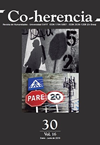The body as a realm of resistance: Foucault, heterotopies and the experiential body
Main Article Content
Keywords
Power, resistance, body, experiential body, exceedance of body, heterotopia
Abstract
Considering the diffuse character Foucault attributes to power relations, it is possible to assert that the subjection of bodies is never absolute, so they are not inexorably determined by the exercise of power. This article shows how the body, as the main target of a predominantly physical power, can eventually become the realm of un-subjection and resistance, the "place" from which that power can be resisted. This is possible in virtue of what is described in this paper as a "heterotopic condition" of the body, which would entail the exceedance and the overflow of subjection processes, and which would ultimately enable to speak about the "experiential body" as the space where the questioning of one's own subjectivity would take place.
Downloads
References
Butler, J. (2006). Gender Trouble. Feminism and the Subversion of Identity. New York: Routledge.
Cahill, A. (2000). Foucault, rape, and the construction of the feminin body. Hypatia, 15(1), 43-63. DOI: 10.1111/j.1527-2001.2000.tb01079.x
Deleuze, G. (1999). ¿Qué es un dispositivo? En AAVV, Michel Foucault, filósofo (pp. 155-163). Barcelona: Gedisa.
Foucault, M. (1971). Nietzsche, La Genealogie, L'Histoire. En Hommage a Jean Hyppolite (pp. 145-172). París: Ed. PUF.
Foucault, M. (1976). Vigilar y castigar. México/Argentina: Siglo XXI.
Foucault, M. (1992a). Poder-cuerpo. En M. Foucault, Microfísica del poder. Edición y traducción de Julia Varela y
Fernando Álvarez-Uría (pp. 103-110). Madrid: La Piqueta.
Foucault, M. (1992b). Poderes y estrategias. En M. Foucault, Microfísica del poder. Edición y traducción de Julia Varela y Fernando Álvarez-Uría (pp. 163-174). Madrid: La Piqueta.
Foucault, M. (1992c). Las relaciones de poder penetran en los cuerpos. En M. Foucault, Microfísica del poder. Edición y traducción de Julia Varela y Fernando Álvarez-Uría (pp. 153-162). Madrid: La Piqueta.
Foucault, M. (1992d). Verdad y poder. En M. Foucault, Microfísica del poder. Edición y traducción de Julia Varela y Fernando Álvarez-Uría (pp. 175-189). Madrid: La Piqueta.
Foucault, M. (1998). El sujeto y el poder. Texto y Contexto, (35), 7-24.
Foucault, M. (1999a). El retorno de la moral. En M. Foucault, Estética, ética y hermenéutica. Obras esenciales. Traducción de Ángel Gabilondo, vol. III (pp. 417-430). Barcelona: Paidós.
Foucault, M. (1999b). La ética del cuidado de sí como práctica de la libertad. En M. Foucault, Estética, ética y hermenéutica. Obras esenciales. Traducción de Ángel Gabilondo, vol. III (pp. 393-416). Barcelona: Paidós.
Foucault, M. (1999c). Michel Foucault, una entrevista: sexo, poder y política de la identidad. En M. Foucault, Estética, ética y hermenéutica. Obras esenciales. Traducción de Ángel Gabilondo, vol. III (pp. 417-430). Barcelona: Paidós.
Foucault, M. (2001). Hay que defender la sociedad. México: Fondo de Cultura Económica.
Foucault, M. (2005). El poder psiquiátrico. Curso en el Collège de France (1973-1974). Buenos Aires: Fondo de Cultura Económica.
Foucault, M. (2006). La voluntad de saber. 10.a ed. Madrid: Siglo XXI.
Foucault, M. (2007). Las palabras y las cosas. México/España/Argentina/Colombia: Siglo XXI.
Foucault, M. (2010). El cuerpo utópico. Las heterotopías. Buenos Aires: Nueva Visión.
Foucault, M. (2011). The Gay Science. Translated by Nicolae Morar and Daniel W. Smith. En: Critical Inquiry, 37. University of Chicago.
Han, B. (2002). Foucault’s Critical Project: Between the Transcendental and the Historical. Trans. Edward Pile. Stanford: Stanford University Press.
Heller, K. J. (1996). Power, subjectification and resistance in Foucault. SubStance, 25(79), 78-110.
Kelly, M. G. (2009). The Political Philosophy of Michel Foucault. New York, London: Routledge.
Lash, S. (1984). Genealogy and the body: Foucault/Deleuze/Nietzche. Theory, Culture & Society, 2(2):1-17. DOI: 10.1177/0263276484002002003
McWorter, L. (1989). Culture or nature? The function of the term “body” in the work of Michel Foucault. Journal of Philosophy, 86(11), 608-614.
Oksala, J. (2004). Anarquic bodies: Foucault and the feminist question of experience. Hypatia, 19(4), 99-121.
Ortega, F. (2010). El cuerpo incierto. Coporeidad, tecnologías médicas y cultura contemporánea. Madrid: Consejo Superior de Investigaciones Científicas.
Pickett, B. (1996). Foucault and the politics of resistance. Polity, 28(4), 445-466.




